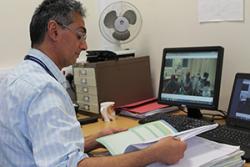Pioneering programme helping elderly people access specialist care nominated for national healthcare award
 Dr Salah Elghenzai, Lead Care Of The Elderly Consultant Physician, BCUHB, carries out an audio-visual appointment as part of the CARTREF project, which has been highly commended at a national healthcare award.A pioneering programme using video technology to help frail and elderly people in rural communities access appointments with consultants has been highly commended at a national award ceremony.
Dr Salah Elghenzai, Lead Care Of The Elderly Consultant Physician, BCUHB, carries out an audio-visual appointment as part of the CARTREF project, which has been highly commended at a national healthcare award.A pioneering programme using video technology to help frail and elderly people in rural communities access appointments with consultants has been highly commended at a national award ceremony.
Betsi Cadwaladr University Health Board’s CARTREF project, which uses video technology to connect rural GP surgeries to consultants at Ysbyty Gwynedd, was shortlisted at the 2016 HSJ Value in Healthcare Awards.
The project uses telemedicine - the use of remote devices to link clinicians and patients - to allow patients at Ysbyty Alltwen near Porthmadog, Dolgellau Hospital, and Ysbyty Bryn Beryl near Pwllheli, consult with doctors in Bangor.
The scheme allows patients to access specialist guidance as close to home as possible, reducing travel and waiting times in the process.
Since launching in September 2013, patients using the service have saved an average travel distance of more than 60 miles through the use of the audio-visual appointments.
The awards ceremony, which took place on May 24 at Manchester Central, recognises examples of outstanding efficiency and improvement in the NHS.
Dr Chris Subbe, a Consultant BCUHB and Clinical Senior Lecturer in Medical Sciences at Bangor University, said: “It’s been a really exciting project, and a great way to link patients living in rural communities with consultants.
“We have put the patient at the centre of this, and that is one of the project’s main principles – we come to them, rather than the other way round, by using modern technology.’’
The programme has proved a hit with patients, with 82 per cent giving an excellent or very good rating, and 86 per cent recommending audio-visual appointments to friends or family.
Staff Nurse Miriam Williams, based in Bangor, said: “Patients were initially quite nervous when we explained they would be seeing the doctor over a video link, but once the conversation began they would relax and forget the doctor was on the screen.’
“We also had a digital inclusion officer working with patients and staff to familiarise them with the technology.
“Some of the stand-out examples include one patient seeking consultation on severe chronic respiratory disease who felt so comfortable with her first video consultation that she initiated a discussion about end of life questions. We also had a 104-year-old patient who was completely un-phased by the new technology.”
Dr Olwen Williams, a consultant physician leading the CARTREF project, said: “This is an amazing project. Everyone who has been involved, whether a user of the service or a carer for these services, has said that this is the way forward to enable people to receive care closer to home, to adopt modern technology, and also to be environmentally friendly.”
“We have had great feedback from patients using the project to date, with more than 83 per cent saying they would recommend virtual consultations to their friends and family.
The CARTREF team also plans to increase access to patients through a virtual hub, which would connect nursing homes in rural locations to their nearest GP surgeries and assessment units at Bangor hospital. The increased service will further reduce travelling times for patients and avoid unnecessary hospital admissions.
The project was funded through the Welsh Government’s Health Technology Fund, an investment in new technology and telehealth to improve patient care.
The project forms part of the Royal College of Physicians’ Future Hospital Programme, which looks to innovate medical care, both in hospital and in the community. Ysbyty Gwynedd is one of four Future Hospital Programme development sites in the UK.
Dr Anita Donley, Clinical Vice-President at the Royal College of Physicians, said: “The Royal College of Physicians Future Hospital Programme has been working with the CARTREF team at Betsi Cadwaladr since 2014 as one of our first four Future Hospital Development Sites.
“The establishment of virtual clinics in community hospitals is an impressive achievement supported by positive patient experience scores. We are delighted by the focus on staff wellbeing throughout the project.”
Publication date: 16 June 2016
